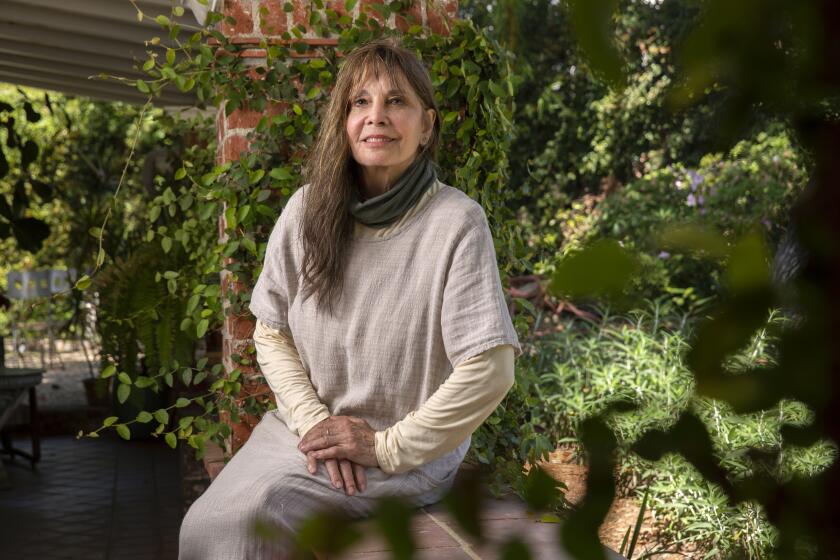At 80, Peter Gerety gets a first film starring role with ‘Working Man’
- Share via
As one of those actors you’ve seen everywhere but probably know little about, Peter Gerety is a welcome addition to any project he joins. A veteran theater actor who only began acting for the camera at 40, he landed serious support roles in “Homicide: Life on the Street,” “The Wire” and “Ray Donovan.” Now, at 80, he’s recently starred in “Working Man” as a blue-collar worker mourning the loss of his son and sidelined by a factory closing who refuses to give in. The Envelope spoke with Gerety via Zoom and got a real history lesson.
So “Working Man” is really your first starring on-camera role?
I guess they call it “No. 1” [on the call sheet]. Something like that. Basically, I’m either a character actor, or I’m a clown.
You seem to wear that character actor badge with pride.
Sure, it’s ages old, just people telling stories around the fire. I did a wonderful play once called “Billy Bishop Goes to War” with Richard Jenkins directing — and I got to play all of these characters in World War I: the grunts, the British fliers, the woman he falls in love with. It’s like your crazy Uncle Harry is sticking a lampshade on his head and becoming a different character. So yes, it’s a badge of honor.
What turned you toward acting in the first place?
My older sister Ann was a brilliant actress. She had her first job at the Provincetown Playhouse on Cape Cod and had three young children by a previous marriage, and needed somebody she could afford to take care of the kids. I was her 13-year-old brother, so I was elected. They were doing “Chicago,” the play before it was a musical, and I got to be a newspaper boy. Ann was playing Roxie Hart and I got to watch them constantly. This was heady stuff, exciting. Sexually? Yes, but psychologically and intellectually interesting. I got my first professional job at 20, now I’m 80 and I really have not stopped working. I never had an “aha!” moment where I wanted to become an actor, I just never felt really at home when I was away from it.
In “Working Man,” your character Allery is cast adrift when his factory closes down — what about him resonated with you?
I don’t feel Allery is depressed. I feel like he’s biding time, treading water and waiting for the next thing that sparks his soul.
Do you come from a working-class background? Did your dad work in factories?
I never knew my father. I mean, I didn’t know him well. My mother was born in 1899 and my dad was born in 1900 and he went into the Navy in World War I and the Army in World War II, which is when I was born. I didn’t even see the cat until I was 6. World War II did a number on him, and he came home kind of screwed up. He had a hard time getting a job as an assistant manager at the supermarket, you know? What I had was my sister — I was footloose and fancy free because my dad turned to alcohol. So I was kind of an angry kid and my mom put me in a Roman Catholic all-boys boarding school.
Talia Shire has a new release, ‘Working Man,’ that she calls a powerful film that ‘spoke to my soul.’
After spending so much time at Trinity Rep in Rhode Island, you started moving into TV and film in the 1980s. What kept you there?
Meg Simon, a wonderful casting agent in New York, called and asked if I wanted to be in a Broadway show [1992’s “Conversations With My Father”]. So I moved to New York because my then-wife and I were getting divorced — which seems to happen to me on a regular basis — and once you’re in New York, you have a tendency to get involved with television and film, which never happened to me in Providence.
And you ended up on some pretty classic TV series, in the end.
Hell, yeah, great shows. I mean, someone might fight me about this, but I think Dick Wolf, [creator of] “Law & Order,” took half of his shooting techniques from [“Homicide” executive producer] Tom Fontana. Television has just been getting better and better. I got really lucky to be on those shows, and they opened doors for me like crazy.
Now that you’re 80, are you planning on making another big acting leap into yet another medium? What goals do you still have?
I’ve done some Zoom theater recently. A friend of mine who worked with us at Trinity Rep, we did the last 15 pages of James Joyce’s “The Dead” [virtually]. I just want to keep doing that kind of stuff. I’ve got two grandkids, and I want there to be a filmic record of their grandfather doing really good stuff. Mainly, I just want to keep working.
More to Read
Sign up for The Envelope
Get exclusive awards season news, in-depth interviews and columnist Glenn Whipp’s must-read analysis straight to your inbox.
You may occasionally receive promotional content from the Los Angeles Times.









